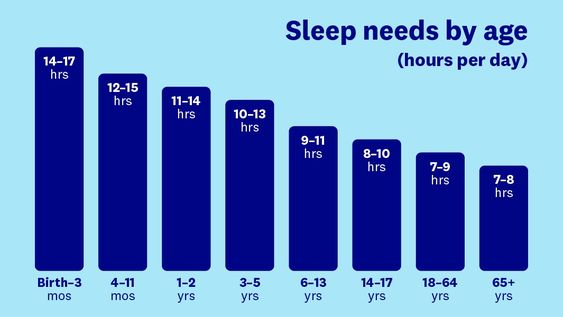Human needs to vary there sleeping time according to their age. We need to calculate our time to sleep and sleep cycles to feed rested. Calculating sleep schedule might not be possible every time but getting enough sleep is critical to the health.
Also Read: Sugar Alcohols: Are they Healthy to Consume?
Sleep guidelines by Age (In Hours)
- (Newborns) Birth to 3 months: 14 to 17 total
- (Infants) 4 to 11 months: 12 to 15 total
- (Toddlers) 1 to 2 years: 11 to 14 total
- (Preschoolers) 3 to 5 years: 10 to 13 total
- (Kids) 6 to 12 years: 9 to 11 per night
- (Teens) 13 to 18 years: 8 to 10 per night
- (Adults) 18 to 64 years: 7 to 9 per night
- (Seniors) 65 years and older: 7 to 8 per night
Here are a few questions to consider when evaluating your sleep needs:
- Do I feel rested after 7 hours of sleep, or do I need at least 8 or 9?
- Do I experience any daytime drowsiness?
- Do I rely on caffeine to keep me going throughout the day?
- Has my sleeping partner noticed me tossing and turning or having any sleep issues during the night?
Sleep calculator
Bedtimes are based on:
- your wake-up time
- completing five or six 90-minute sleep cycles
- allowing 15 minutes to fall asleep
| Wake-up time | Bedtime: 7.5 hours of sleep (5 cycles) |
Bedtime: 9 hours of sleep (6 cycles) |
| 4 a.m. | 8:15 p.m. | 6:45 p.m. |
| 4:15 a.m. | 8:30 p.m. | 7 p.m. |
| 4:30 a.m. | 8:45 p.m. | 7:15 p.m. |
| 4:45 a.m. | 9 p.m. | 7:30 p.m. |
| 5 a.m. | 9:15 p.m. | 7:45 p.m. |
| 5:15 a.m. | 9:30 p.m. | 8 p.m. |
| 5:30 a.m. | 9:45 p.m. | 8:15 p.m. |
| 5:45 a.m. | 10 p.m. | 8:30 p.m. |
| 6 a.m. | 10:15 p.m. | 8:45 p.m. |
| 6:15 a.m. | 10:30 p.m. | 9 p.m. |
| 6:30 a.m. | 10:45 p.m. | 9:15 p.m. |
| 6:45 a.m. | 11 p.m. | 9:30 p.m. |
| 7 a.m. | 11:15 p.m. | 9:45 p.m. |
| 7:15 a.m. | 11:30 p.m. | 10 p.m. |
| 7:30 a.m. | 11:45 p.m. | 10:15 p.m. |
| 7:45 a.m. | 12 p.m. | 10:30 p.m. |
| 8 a.m. | 12:15 a.m. | 10:45 p.m. |
| 8:15 a.m. | 12:30 a.m. | 11 p.m. |
| 8:30 a.m. | 12:45 a.m. | 11:15 p.m. |
| 8:45 a.m. | 1 a.m. | 11:30 p.m. |
| 9 a.m. | 1:15 a.m. | 11:45 p.m. |
What happens if you don’t get enough sleep?
Sleeping little or not getting proper sleep can affect your bodily system and their functions to work properly. Health and mental health conditions can contribute to sleep deprivation. This can include:
- depression
- anxiety
- obstructive sleep apnea
- chronic pain
And by getting even less sleep can cause these health conditions to worsen. Even though occasionally not getting enough sleep might not seriously impact your health but experts have found that long sleep deprivation can cause serious health consequences, especially mental health, chronic diseases and early death.
Sleep deprivation can impact short-term and long-term physical, emotional, and cognitive health.
Physical impacts
A night of poor sleep can cause physical effects, including:
- drowsiness
- headache
- dark circles under the eyes
- pale skin
Long-term sleep deprivation can take a more severe toll on your health, leading to:
- decreased immunity, which might make it difficult for your body to fight off diseases.
- High cortisol levels can lead to high blood pressure and other health issues.
- Increased hunger and desires for sugar and carbohydrates.
- Weight changes, skin changes (e.g., wrinkles, fine lines, loss of suppleness), and chronic inflammation.
Emotional and mental health impacts
Not getting enough sleep can affect your mood.
Not getting enough sleep can lead to:
- Feeling grumpy and irritable.
- Sudden mood changes
- Difficulties controlling emotions.
- Having difficulties coping with stress. Understanding and interacting with people.
Research also suggests sleep deprivation can worsen mental health symptoms, including depression, anxiety, paranoia, and hallucinations.
Sleep deprivation has also been linked to symptoms of some mental health conditions, including:
- Depression
- Anxiety disorders
- Attention deficit hyperactivity disorder (ADHD)

